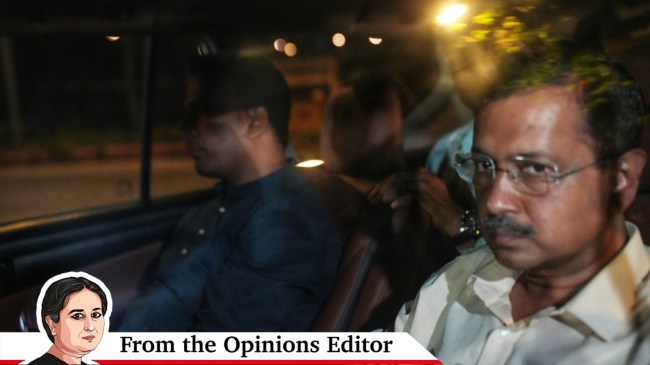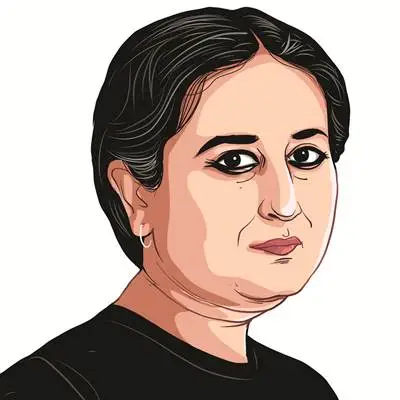Opinion Vandita Mishra writes: The arrest of a chief minister
Ahead of a crucial election, BJP brandishes its view of politics as a zero-sum game, a fight to the finish
 Delhi Chief Minister Arvind Kejriwal was arrested by the Enforcement Directorate in connection with the excise policy case on Thursday (March 24). (Express photo by Abhinav Saha)
Delhi Chief Minister Arvind Kejriwal was arrested by the Enforcement Directorate in connection with the excise policy case on Thursday (March 24). (Express photo by Abhinav Saha) Dear Express Reader
A sitting chief minister, who is not convicted, is arrested ahead of a general election, while the model code of conduct is in place. There are many jolting firsts in that sentence, that have several disturbing implications for a constitutional democracy.
Arvind Kejriwal’s arrest by the Enforcement Directorate last Thursday comes in a context that is made not just of the particular case in which he, his former deputy and his party MP are implicated — involving alleged kickbacks in Delhi’s now-scrapped liquor policy. That case must take its lawful course, of course.
The larger and longer context of his arrest is made of the unlovely war of attrition and serial exchange of unpleasantries between the Narendra Modi government at the Centre and the Arvind Kejriwal government in Delhi, on an unlevel playing field which hands the overwhelming advantage to the BJP.
In no particular order, the Modi government’s appointment of Lieutenant-Governors in Delhi who have constantly sought to override the duly elected government; the BJP-led Centre’s bid to flout a Supreme Court verdict that limited the role of the L-G in the national capital by an ordinance that effectively rendered the elected CM a minority voice in the governance of Delhi; the BJP’s attempt to hijack the election of the mayor of Chandigarh, won by the AAP in the capital of Punjab, the other state it rules apart from Delhi.
The more immediate context is made of the aggressive strikes by the BJP and its government against other parties of the Opposition in the run-up to election — the freezing of Congress bank accounts, for instance, and the opening of BJP doors to the Congress’s cross-voting MLAs in last month’s Rajya Sabha election in Himachal Pradesh.
It doesn’t take much to connect the dots — they add up to a ruling party that seeks to debilitate its opponents and squeeze the Opposition space, while displaying its absolute power absolutely. That it does so with apparent impunity ahead of an election, the model code of conduct in place, frames a challenge that must be addressed by institutions like the Election Commission and the Court.
But the proximity of Kejriwal’s arrest with the election raises another set of questions too.
First, can the worry that the BJP is arrogating to itself too much power, that there are not enough checks and balances on its exercise of that power, significantly erode its other appeals to voters in a multi-party democracy?
The election outcome will, among other things, tell us whether the Modi-BJP’s rage and rampage against the Opposition, its selective use of central agencies like the ED, CBI and the Income Tax department to target non-BJP leaders and parties, its splitting of other parties and felling of non-BJP governments, is causing concern among India’s voters.
The BJP clearly calculates that it isn’t. It may even be right — its electoral successes so far can be read to have shown that its heavy-handedness vis a vis opponents and critics has not dented its support among the people. This could be because of many reasons — the fact that the aam aadmi and aurat are weary and cynical about the arbitrary use of power by ruling parties and governments, that the Opposition parties have a pretty scarred record on this count too, or because the BJP’s record and promises on other things, on Hindutva, nationalism, Article 370, social welfare schemes, or its sheer projection of winnability, trump the unease over its winner-takes-all approach skewing the playing field.
But there is another question here, irrespective of the final tallies etched on the scoreboard in June. It is this: Even if the BJP wins again, even if the voters hand it a successive third term, does its view of politics as a zero-sum game and as a fight-to-the-finish show the best way forward in a diverse democracy where negotiation and give-and-take is, or it should be, key?
That’s a question that may not be answered by one election. The answer may not even lie in the voice of the majority. It may need a wider stepping back from the overheated fray in order to dig deeper and retrieve a more spacious and more expansive definition of democracy.
Till next time, and wishing you a colourful Holi,
Vandita



